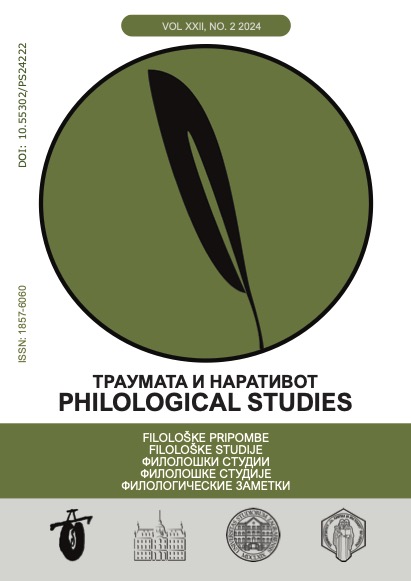THE SPEECH ACT OF APOLOGY AMONG MACEDONIAN LANGUAGE SPEAKERS
Abstract
This paper examines the most commonly used strategies and substrategies for apology among the young population in North Macedonia, with the aim to identify similarities and differences in relation to the use of these strategies and substrategies among the adult population. The sample consists of 50 speech acts of apology collected from people aged 21 to 31 years, which represents a kind of corpus. To collect data, a survey with open-ended questions was used, and the analysis relies on a comparison with the results from previous research, qualitative content analysis based on coding, and the interpretative-inductive method.
The results show that young people use the same strategies and substrategies as adults. Futhermore, they use more direct strategies, especially the strategy of taking responsibility and its substrategies of explanation and lack of intention. Furthermore, the results confirm that, within this strategy, young speakers do not use the substrategy of ‘the interlocutor is right’ and expressions of embarrassment, at all. The results also show that, in relation to the direct strategy of expressions of apology, young speakers mostly use the substrategies of asking for forgiveness, offering an apology, and expressing regret. The substrategies of foreign words, mitigating factors, and expressions of reconciliation are not observed. Indirect strategies, on the other hand, are used much less frequently than direct ones. Of these, young speakers use the strategy of offering compensation or correcting the error, the most.
Downloads
References
Кусевска, Марија, Бужаровска, Елени. (2020). Прагматика: Јазик и комуникација. Скопје: Арс-Ламина публикации, Арс Либрис. [Kusevska, Marija, Buzharovska, Eleni. (2020). Pragmatika: Jazik i komunikacija. [Pragmatics: Language and communication]. Skopje: Ars-Lamina publikacii, Ars Libris. (In Macedonian)]
Милосавлевиh, Бојана. (2007). „Форме извињења у формалном и неформалном стилу комуникације.“ Стил 6, 209−222. Београд: Међународно удружење „Стил“. Milosavlevikj, Bojana. (2007). Forme izvinjenja u formalnom i neformalnom stilu komunikacije. [Forms of apology in formal and informal style of communication] In Style 6. 209−222. Belgrade: Meђunarodno udruženje „Stil“]. (In Serbian)].
Трајкова, Зорица, Нешковска, Силвана, Кусевска, Марија, Смичковска, Фанија. (2014). Говорни чинови: Барање, заблагодарување, извинување, прeговарање во англискиот и македонскиот јазик. Скопје: Академски печат. [Trajkova, Zorica, Neshkovska, Silvana, Kusevska, Marija, Smichkovska, Fanija. (2014). [Speech acts: Requesting, thanking, appologizing, negotiation in English and Macedonian language. (In Macedonian)].
Bloomer, Aileen. (2010). “Designing a questionnaire”. In: Hunston, Susan, Oakey, David. (eds.). Introducing applied linguistics: Concepts and skills. 145−150. London, New York: Routledge Taylor & Francis Group.
Blum-Kulka, Shoshana, House, Juliane, Kasper, Gabriele. (eds.). (1989). Cross-cultural pragmatics: Requests and apologies. Norwood: Ablex Publishing Corporation.
Brown, Dean, James. (2009). “Open-response items in questionnaires. ” In Heigham, Juanita, Croker, A. Robert. (eds.). Qualitative research in applied linguistics: A practical introduction. 200-219. Basingstoke: Palgrave Macmillan.
Griffee, T., Dale. (2018). An introduction to second language research methods: Design and data, 2 nd ed. Berkeley, Kyoto: TESL-EJ Publications.
Harris, J., Richard. (2003). “Traditional Nomothetic Approaches”. In: Davis, F., Stephen. (ed.). Handbook of research methods in experimental psychology. 41−65. Malden, Oxford: Blackwell Publishing.
Hardie, Аndrew. (2016). “Corpus linguistics”. In Keith Allan, ed., The Routledge handbook of linguistics. 502–515. Routledge.
Harding, Thomas, Whitehead, Dean. (2016). “Analyzing data in qualitative research”. In: Schneider, Z. & Whitehead, D. (eds.), Nursing and midwifery research: methods and appraisal for evidence-based practice, 5th ed.,. ch. 8. Elsevier.
Holmes, Janet. (1990). “Apologies in New Zealand English 1”. Language in society 19. 155−199.
Kahlke, М. Renate. (2014). “Generic qualitative approaches: pitfalls and benefits of methodological mixology”. International Journal of Qualitative Methods 13(1). 37–52.
Lincoln, S., Yvonna, Guba, G., Egon. (1985). Naturalistic inquiry. Beverly Hills, London: Sage Publications.
Neuman, Lawrence, William. (2000). Social research methods: Qualitative and quantitative approaches, 4 nd ed. Boston, London: Allyn and Bacon.
Nunan, David. (1992). Research methods in language learning. Cambridge, New York: Cambridge University Press.
Ogiermann, Eva. (2009). On apologising in negative and positive politeness cultures. Amsterdam, Philadelphia: John Benjamins Publishing Company.
Olshtain, Elite, Cohen, D. Andrew. (1983). “Apology: A speech-act set”. In: Wolfson, Nessa, Judd, Elliot. (eds.). Sociolinguistics and language asquisition. 18−35. Rowley, Massachusetts: Newbury House Publishers.
Searle, R. John. (1979). Expression and meaning: Studies in the theory of speech acts. Cambridge, New York: Cambridge University Press.
Searle, R. John. (1970). Speech acts: An essay in the philosophy of language. London, New York: Cambridge University Press.
Schreier, Margrit. (2014). “Qualitative content analysis”. In: Flick, U. (ed.). The sage handbook of qualitative data analysis. 170−183. Los Angeles, London: Sage Publications.
Thomas, R., David. (2006). A general inductive approach for analyzing qualitative evaluation data. American Journal of Evaluation, 27(2), 237−246.
Yin, K. Robert. (2011). Qualitative research from start to finish. The Guilford Press.
Downloads
Published
Issue
Section
License
Copyright (c) 2025 Blagica Naumova, Violeta Janusheva

This work is licensed under a Creative Commons Attribution-NonCommercial-NoDerivatives 4.0 International License.
Philological studies © 2019. This work is licensed under a Creative Commons Attribution-Noncommercial-No Derivative Works 3.0 Unported License


